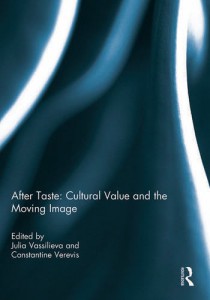After Taste
Cultural Value and the Moving Image (livre en anglais)
Sous la direction de Julia Vassilieva et Constantine Verevis


Moyenne des votes : ![]()
| 0 | vote | |
| 0 | vote | |
| 0 | vote | |
| 0 | vote |
Votre vote : -
Description de l'ouvrage :
In the wake of the debates over high/low culture distinction spilling into the effective dismantling of the boundary that once separated them, the past decade has seen the explosion of ‘bad taste’ production on screen. Starting with paracinema or ‘badfilm’ – a movement that has grown up around sleazy, excessive, or poorly executed B-movies and has come to encompass disreputable and unworthy films – this trend has been evident in various formats: on television and in video-art, low-budget and straight to TV films, amateur and home movies. The proliferation of trash on screen can be seen as delivering the final blow to the vexed issue of taste.
More importantly, it prompts a reconsideration of some critical issues surrounding production, circulation, understanding and teaching of ‘bad objects’ in the media. This collection of essays, written by international film and television scholars, provides detailed critical analysis of the issues surrounding judgements of cultural value and taste, feeling and affect, cultural morals and politics, research methodologies and teaching strategies in the new landscape of ‘after taste’ media. Addressing global and local developments – from global Hollywood to Australian indigenous film and television, through auteurs Sergei Eisenstein to Jerry Bruckheimer, on to examples such as Twilight to Sukiyaki Western Django – the essays in this book offer a range of critical tools for understanding the recent shifts affecting cultural, aesthetic and political value of the moving image.
This book was originally published as a special issue of Continuum: Journal of Media & Cultural Studies.
À propos des auteurs :
Julia Vassilieva teaches Film and Television Studies at Monash University, Melbourne, Australia. She is an author of Re-thinking the Experience of Immigration: From Loss to Gain (2010). She has published articles in a variety of journals, including Film-Philosophy, Senses of Cinema, Rouge, Cinema Studies, The New International Journal of Humanities and contributed as an editor to Transcultural Studies: A Series in Interdisciplinary Research. Constantine Verevis is Senior Lecturer in Film and Television Studies at Monash University, Melbourne, Australia. He is author of Film Remakes (2006) and co-editor of Second Takes: Critical Approaches to the Film Sequel (2010). He is presently co-editing two further volumes: Film Trilogies (with Claire Perkins) and Remake-Remodel (with Kathleen Loock).
Voir le site internet de l'éditeur Routledge
> Des mêmes auteurs :
Beyond the Essay Film (2020)
Subjectivity, Textuality and Technology
Dir. Julia Vassilieva et Deane Williams
Sujet : Théorie
Australian Film Theory and Criticism (2018)
Volume 3: Documents
Dir. Deane Williams et Constantine Verevis
US Independent Film After 1989 (2015)
Possible Films
Dir. Claire Perkins et Constantine Verevis
Sujet : Genre > cinéma indépendant
B Is for Bad Cinema (2015)
Aesthetics, Politics, and Cultural Value
Dir. Claire Perkins et Constantine Verevis
Sujet : Généralités
Australian Film Theory and Criticism (2013)
Volume 1: Critical Positions
Second Takes (2010)
Critical Approaches to the Film Sequel
Dir. Carolyn Jess-Cooke et Constantine Verevis
Sujet : Economie
> Sur un thème proche :
Sexualised Masculinity (2025)
Men's Bodies in 21st Century Media Culture
de John Mercer et Clarissa Smith
Sujet : Sociologie
Radical Reality (2025)
Documentary Storytelling and the Global Fight for Social Justice
de Caty Borum et David Conrad-Pérez
Sujet : Sociologie
Doing Sociology Through Film and Literature (2025)
Imaginings of the Social World
de John Goodwin et Laurie Parsons
Sujet : Sociologie
The Routledge Handbook of Motherhood on Screen (2025)
Dir. Susan Liddy et Deirdre Flynn
Sujet : Sociologie
The Drive-In (2025)
Outdoor Cinema in 1950s America and the Popular Imagination
de Guy Barefoot
Sujet : Sociologie